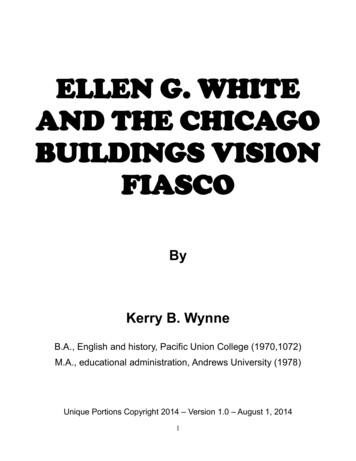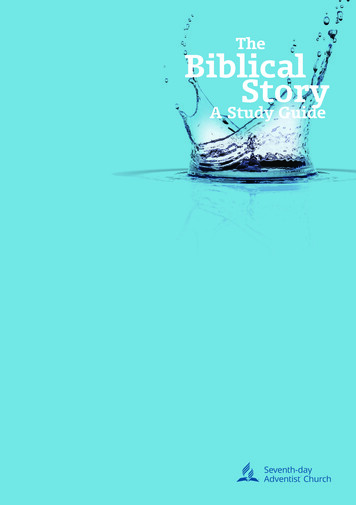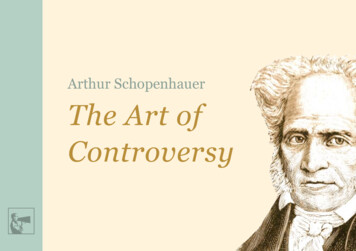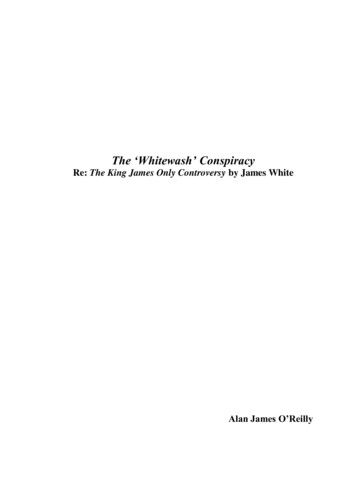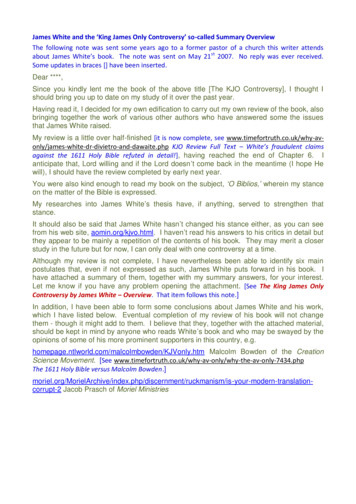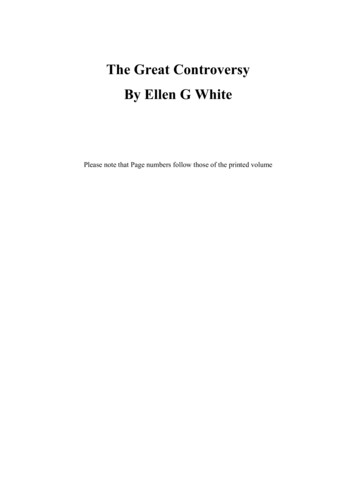
Transcription
The Great ControversyBy Ellen G WhitePlease note that Page numbers follow those of the printed volume
PREFACEPage iiiThis book, reader, is not published to tell us that there is sin and woe and misery in this world. Weknow it all too well. This book is not published to tell us that there is an irreconcilable controversybetween darkness and light, sin and righteousness, wrong and right, death and life. In our heart ofhearts we know it, and know that we are participators, actors, in the conflict.But to every one of us comes at times a longing to know more of the great controversy. How did thecontroversy begin? Or was it always here? What elements enter into its awfully complex aspect?How am I related to it? What is my responsibility? I find myself in this world by no choice of myown. Does that mean to me evil or good?What are the great principles involved? How long will the controversy continue? What will be itsending? Will this earth sink, as some scientists say, into the depths of a sunless, frozen, eternalnight? Or is there a better future?The question comes closer still: how may the controversy in my own heart, the strife betweeninflowing selfishness and outgoing love, be settled in the victory of good, and settled forever? Whatdoes the Bible say? What has God to teach us upon this eternally important question?It is the aim of this book, reader, to help the troubled soul to a right solution of all these problems. Itis written by one who has tasted and found that God is good, and who has learned in communionwith God and the study of His word that the secret of the Lord is with them that fear Him, and thatHe will show them His covenant.That we may better understand the principles of the all-important controversy, in which the life of auniverse is involved, the author has set it before us in great, concrete object lessons of the lasttwenty centuries.The book opens with the sad closing scenes of Jerusalem's history, the city of God's chosen, afterher rejection of thePage ivMan of Calvary, who came to save. Thence onward along the great highway of the nations, it pointsus to the persecutions of God's children in the first centuries; the great apostasy which followed inHis church; the world-awakening of the Reformation, in which some of the great principles of thecontroversy are clearly manifest; the awful lesson of the rejection of right principles by France; therevival and exaltation of the Scriptures, and their beneficent, life-saving influence; the religiousawakening of the last days; the unsealing of the radiant fountain of God's word, with its wonderfulrevelations of light and knowledge to meet the baleful upspringing of every delusion of darkness.The present impending conflict, with the vital principles involved, in which no one can be neutral,is simply, lucidly, strongly, set forth.Last of all, we are told of the eternal and glorious victory of good over evil, right over wrong, lightover darkness, joy over sorrow, hope over despair, glory over shame, life over death, andeverlasting, long-suffering love over vindictive hate.
Beginning with its first edition (1888), followed by an author's revision (1911), this outstandingwork has achieved worldwide circulation through many editions and translations. The reader willfind that the author writes frankly and vigorously, pointing out errors and suggesting solutionsbased on the infallible word of God. And even though the last few decades have witnessed shiftsand adjustments in the socioreligious world, the main scheme and the future projections presentedin this book maintain today full timeliness and absorbing interest.Former editions of this book have brought many souls to the True Shepherd; it is the prayer of thepublisher that this edition may be even more fruitful of eternal good.The Publishers.
The Great ControversyIntroductionPage vBefore the entrance of sin, Adam enjoyed open communion with his Maker; but since manseparated himself from God by transgression, the human race has been cut off from this highprivilege. By the plan of redemption, however, a way has been opened whereby the inhabitants ofthe earth may still have connection with heaven. God has communicated with men by His Spirit,and divine light has been imparted to the world by revelations to His chosen servants. "Holy men ofGod spake as they were moved by the Holy Ghost." 2 Peter 1:21.During the first twenty-five hundred years of human history, there was no written revelation. Thosewho had been taught of God, communicated their knowledge to others, and it was handed downfrom father to son, through successive generations. The preparation of the written word began in thetime of Moses. Inspired revelations were then embodied in an inspired book. This work continuedduring the long period of sixteen hundred years--from Moses, the historian of creation and the law,to John, the recorder of the most sublime truths of the gospel.The Bible points to God as its author; yet it was written by human hands; and in the varied style ofits different books it presents the characteristics of the several writers. The truths revealed are all"given by inspiration of God" (2 Timothy 3:16); yet they are expressed in the words of men. TheInfinite One by His Holy Spirit has shed light into the minds and hearts of His servants. He hasgiven dreams and visions, symbols and figures; and those to whom the truth was thus revealed havethemselves embodied the thought in human language.The Ten Commandments were spoken by God Himself, and were written by His own hand. Theyare of divine,Page viand not of human composition. But the Bible, with its God-given truths expressed in the languageof men, presents a union of the divine and the human. Such a union existed in the nature of Christ,who was the Son of God and the Son of man. Thus it is true of the Bible, as it was of Christ, that"the Word was made flesh, and dwelt among us." John 1:14.Written in different ages, by men who differed widely in rank and occupation, and in mental andspiritual endowments, the books of the Bible present a wide contrast in style, as well as a diversityin the nature of the subjects unfolded. Different forms of expression are employed by differentwriters; often the same truth is more strikingly presented by one than by another. And as severalwriters present a subject under varied aspects and relations, there may appear, to the superficial,careless, or prejudiced reader, to be discrepancy or contradiction, where the thoughtful, reverentstudent, with clearer insight, discerns the underlying harmony.As presented through different individuals, the truth is brought out in its varied aspects. One writeris more strongly impressed with one phase of the subject; he grasps those points that harmonizewith his experience or with his power of perception and appreciation; another seizes upon adifferent phase; and each, under the guidance of the Holy Spirit, presents what is most forcibly
impressed upon his own mind--a different aspect of the truth in each, but a perfect harmony throughall. And the truths thus revealed unite to form a perfect whole, adapted to meet the wants of men inall the circumstances and experiences of life.God has been pleased to communicate His truth to the world by human agencies, and He Himself,by His Holy Spirit, qualified men and enabled them to do this work. He guided the mind in theselection of what to speak and what to write. The treasure was entrusted to earthen vessels, yet it is,nonetheless, from Heaven. The testimony isPage viiconveyed through the imperfect expression of human language, yet it is the testimony of God; andthe obedient, believing child of God beholds in it the glory of a divine power, full of grace andtruth.In His word, God has committed to men the knowledge necessary for salvation. The HolyScriptures are to be accepted as an authoritative, infallible revelation of His will. They are thestandard of character, the revealer of doctrines, and the test of experience. "Every scripture inspiredof God is also profitable for teaching, for reproof, for correction, for instruction which is inrighteousness; that the man of God may be complete, furnished completely unto every good work."2 Timothy 3:16, 17, R.V.Yet the fact that God has revealed His will to men through His word, has not rendered needless thecontinued presence and guiding of the Holy Spirit. On the contrary, the Spirit was promised by ourSaviour, to open the word to His servants, to illuminate and apply its teachings. And since it was theSpirit of God that inspired the Bible, it is impossible that the teaching of the Spirit should ever becontrary to that of the word.The Spirit was not given--nor can it ever be bestowed-- to supersede the Bible; for the Scripturesexplicitly state that the word of God is the standard by which all teaching and experience must betested. Says the apostle John, "Believe not every spirit, but try the spirits whether they are of God:because many false prophets are gone out into the world." 1 John 4:1. And Isaiah declares, "To thelaw and to the testimony: if they speak not according to this word, it is because there is no light inthem." Isaiah 8:20.Great reproach has been cast upon the work of the Holy Spirit by the errors of a class that, claimingits enlightenment, profess to have no further need of guidance from the word of God. They aregoverned by impressions which they regard as the voice of God in the soul. But the spirit thatcontrols them is not the Spirit of God. This following ofPage viiiimpressions, to the neglect of the Scriptures, can lead only to confusion, to deception and ruin. Itserves only to further the designs of the evil one. Since the ministry of the Holy Spirit is of vitalimportance to the church of Christ, it is one of the devices of Satan, through the errors of extremistsand fanatics, to cast contempt upon the work of the Spirit and cause the people of God to neglectthis source of strength which our Lord Himself has provided.In harmony with the word of God, His Spirit was to continue its work throughout the period of thegospel dispensation. During the ages while the Scriptures of both the Old and the New Testament
were being given, the Holy Spirit did not cease to communicate light to individual minds, apartfrom the revelations to be embodied in the Sacred Canon. The Bible itself relates how, through theHoly Spirit, men received warning, reproof, counsel, and instruction, in matters in no way relatingto the giving of the Scriptures. And mention is made of prophets in different ages, of whoseutterances nothing is recorded. In like manner, after the close of the canon of the Scripture, the HolySpirit was still to continue its work, to enlighten, warn, and comfort the children of God.Jesus promised His disciples, "The Comforter which is the Holy Ghost, whom the Father will sendin My name, He shall teach you all things, and bring all things to your remembrance, whatsoever Ihave said unto you." "When He, the Spirit of truth, is come, He will guide you into all truth: . . . andHe will show you things to come." John 14:26; 16:13. Scripture plainly teaches that these promises,so far from being limited to apostolic days, extend to the church of Christ in all ages. The Saviourassures His followers, "I am with you alway, even unto the end of the world." Matthew 28:20. AndPaul declares that the gifts and manifestations of the Spirit were set in the church "for the perfectingof the saints, for the work of the ministry, for the edifying of the body of Christ: till we all come inthe unity of the faith, andPage ixof the knowledge of the Son of God, unto a perfect man, unto the measure of the stature of thefullness of Christ." Ephesians 4:12, 13.For the believers at Ephesus the apostle prayed, "That the God of our Lord Jesus Christ, the Fatherof glory, may give unto you the Spirit of wisdom and revelation in the knowledge of Him: the eyesof your understanding being enlightened; that ye may know what is the hope of His calling, and . . .what is the exceeding greatness of His power to usward who believe." Ephesians 1:17-19. Theministry of the divine Spirit in enlightening the understanding and opening to the mind the deepthings of God's holy word, was the blessing which Paul thus besought for the Ephesian church.After the wonderful manifestation of the Holy Spirit on the Day of Pentecost, Peter exhorted thepeople to repentance and baptism in the name of Christ, for the remission of their sins; and he said:"Ye shall receive the gift of the Holy Ghost. For the promise is unto you, and to your children, andto all that are afar off, even as many as the Lord our God shall call." Acts 2:38, 39.In immediate connection with the scenes of the great day of God, the Lord by the prophet Joel haspromised a special manifestation of His Spirit. Joel 2:28. This prophecy received a partialfulfillment in the outpouring of the Spirit on the Day of Pentecost; but it will reach its fullaccomplishment in the manifestation of divine grace which will attend the closing work of thegospel.The great controversy between good and evil will increase in intensity to the very close of time. Inall ages the wrath of Satan has been manifested against the church of Christ; and God has bestowedHis grace and Spirit upon His people to strengthen them to stand against the power of the evil one.When the apostles of Christ were to bear His gospel to the world and to record it for all future ages,they were especially endowed with the enlightenment of the Spirit. But as thePage xchurch approaches her final deliverance, Satan is to work with greater power. He comes down"having great wrath, because he knoweth that he hath but a short time." Revelation 12:12. He will
work "with all power and signs and lying wonders." 2 Thessalonians 2:9. For six thousand yearsthat mastermind that once was highest among the angels of God has been wholly bent to the workof deception and ruin. And all the depths of satanic skill and subtlety acquired, all the crueltydeveloped, during these struggles of the ages, will be brought to bear against God's people in thefinal conflict. And in this time of peril the followers of Christ are to bear to the world the warningof the Lord's second advent; and a people are to be prepared to stand before Him at His coming,"without spot, and blameless." 2 Peter 3:14. At this time the special endowment of divine grace andpower is not less needful to the church than in apostolic days.Through the illumination of the Holy Spirit, the scenes of the long-continued conflict between goodand evil have been opened to the writer of these pages. From time to time I have been permitted tobehold the working, in different ages, of the great controversy between Christ, the Prince of life, theAuthor of our salvation, and Satan, the prince of evil, the author of sin, the first transgressor ofGod's holy law. Satan's enmity against Christ has been manifested against His followers. The samehatred of the principles of God's law, the same policy of deception, by which error is made toappear as truth, by which human laws are substituted for the law of God, and men are led toworship the creature rather than the Creator, may be traced in all the history of the past. Satan'sefforts to misrepresent the character of God, to cause men to cherish a false conception of theCreator, and thus to regard Him with fear and hate rather than with love; his endeavors to set asidethe divine law, leading the people to think themselves free from its requirements; and hispersecution of those who dare to resist his deceptions, have been steadfastly pursued in all ages.They may be tracedPage xiin the history of patriarchs, prophets, and apostles, of martyrs and reformers.In the great final conflict, Satan will employ the same policy, manifest the same spirit, and work forthe same end as in all preceding ages. That which has been, will be, except that the coming strugglewill be marked with a terrible intensity such as the world has never witnessed. Satan's deceptionswill be more subtle, his assaults more determined. If it were possible, he would lead astray the elect.Mark 13:22, R.V.As the Spirit of God has opened to my mind the great truths of His word, and the scenes of the pastand the future, I have been bidden to make known to others that which has thus been revealed--totrace the history of the controversy in past ages, and especially so to present it as to shed a light onthe fast-approaching struggle of the future. In pursuance of this purpose, I have endeavored to selectand group together events in the history of the church in such a manner as to trace the unfolding ofthe great testing truths that at different periods have been given to the world, that have excited thewrath of Satan, and the enmity of a world-loving church, and that have been maintained by thewitness of those who "loved not their lives unto the death."In these records we may see a foreshadowing of the conflict before us. Regarding them in the lightof God's word, and by the illumination of His Spirit, we may see unveiled the devices of the wickedone, and the dangers which they must shun who would be found "without fault" before the Lord atHis coming.The great events which have marked the progress of reform in past ages are matters of history, wellknown and universally acknowledged by the Protestant world; they are facts which none cangainsay. This history I have presented briefly, in accordance with the scope of the book, and the
brevity which must necessarily be observed, the facts having been condensed into as little space asseemed consistent withPage xiia proper understanding of their application. In some cases where a historian has so grouped togetherevents as to afford, in brief, a comprehensive view of the subject, or has summarized details in aconvenient manner, his words have been quoted; but in some instances no specific credit has beengiven, since the quotations are not given for the purpose of citing that writer as authority, butbecause his statement affords a ready and forcible presentation of the subject. In narrating theexperience and views of those carrying forward the work of reform in our own time, similar use hasbeen made of their published works.It is not so much the object of this book to present new truths concerning the struggles of formertimes, as to bring out facts and principles which have a bearing on coming events. Yet viewed as apart of the controversy between the forces of light and darkness, all these records of the past areseen to have a new significance; and through them a light is cast upon the future, illumining thepathway of those who, like the reformers of past ages, will be called, even at the peril of all earthlygood, to witness "for the word of God, and for the testimony of Jesus Christ."To unfold the scenes of the great controversy between truth and error; to reveal the wiles of Satan,and the means by which he may be successfully resisted; to present a satisfactory solution of thegreat problem of evil, shedding such a light upon the origin and the final disposition of sin as tomake fully manifest the justice and benevolence of God in all His dealings with His creatures; andto show the holy, unchanging nature of His law, is the object of this book. That through itsinfluence souls may be delivered from the power of darkness, and become "partakers of theinheritance of the saints in light," to the praise of Him who loved us, and gave Himself for us, is theearnest prayer of the writer.E.G.W.
1. The Destruction of Jerusalem"If thou hadst known, even thou, at least in this thy day, the things which belong unto thy peace! butnow they are hid from thine eyes. For the days shall come upon thee, that thine enemies shall cast atrench about thee, and compass thee round, and keep thee in on every side, and shall lay thee evenwith the ground, and thy children within thee; and they shall not leave in thee one stone uponanother; because thou knewest not the time of thy visitation." Luke 19:42-44.From the crest of Olivet, Jesus looked upon Jerusalem. Fair and peaceful was the scene spread outbefore Him. It was the season of the Passover, and from all lands the children of Jacob had gatheredthere to celebrate the great national festival. In the midst of gardens and vineyards, and green slopesstudded with pilgrims' tents, rose the terraced hills, the stately palaces, and massive bulwarks ofIsrael's capital. The daughter of Zion seemed in her pride to say, I sit a queen and shall see nosorrow; as lovely then, and deeming herself as secure in Heaven's favor, as when, ages before, theroyal minstrel sang: "Beautiful for situation, the joy of the whole earth, is Mount Zion, . . . the cityof the great King." Psalm 48:2. In full view were the magnificent buildings of the temple. The raysof the setting sun lighted up the snowy whiteness of its marble walls and gleamed from golden gateand tower and pinnacle. "The perfection ofPage 18beauty" it stood, the pride of the Jewish nation. What child of Israel could gaze upon the scenewithout a thrill of joy and admiration! But far other thoughts occupied the mind of Jesus. "When Hewas come near, He beheld the city, and wept over it." Luke 19:41. Amid the universal rejoicing ofthe triumphal entry, while palm branches waved, while glad hosannas awoke the echoes of the hills,and thousands of voices declared Him king, the world's Redeemer was overwhelmed with a suddenand mysterious sorrow. He, the Son of God, the Promised One of Israel, whose power hadconquered death and called its captives from the grave, was in tears, not of ordinary grief, but ofintense, irrepressible agony.His tears were not for Himself, though He well knew whither His feet were tending. Before Him layGethsemane, the scene of His approaching agony. The sheepgate also was in sight, through whichfor centuries the victims for sacrifice had been led, and which was to open for Him when He shouldbe "brought as a lamb to the slaughter." Isaiah 53:7. Not far distant was Calvary, the place ofcrucifixion. Upon the path which Christ was soon to tread must fall the horror of great darkness asHe should make His soul an offering for sin. Yet it was not the contemplation of these scenes thatcast the shadow upon Him in this hour of gladness. No foreboding of His own superhuman anguishclouded that unselfish spirit. He wept for the doomed thousands of Jerusalem--because of theblindness and impenitence of those whom He came to bless and to save.The history of more than a thousand years of God's special favor and guardian care, manifested tothe chosen people, was open to the eye of Jesus. There was Mount Moriah, where the son ofpromise, an unresisting victim, had been bound to the altar--emblem of the offering of the Son ofGod. There the covenant of blessing, the glorious Messianic promise, had been confirmed to thefather of the faithful. Genesis 22:9, 16-18. There the flames of the sacrifice ascending to heavenfrom the threshing floor of Ornan had turnedPage 19
aside the sword of the destroying angel (1 Chronicles 21)-- fitting symbol of the Saviour's sacrificeand mediation for guilty men. Jerusalem had been honored of God above all the earth. The Lord had"chosen Zion," He had "desired it for His habitation." Psalm 132:13. There, for ages, holy prophetshad uttered their messages of warning. There priests had waved their censers, and the cloud ofincense, with the prayers of the worshipers, had ascended before God. There daily the blood of slainlambs had been offered, pointing forward to the Lamb of God. There Jehovah had revealed Hispresence in the cloud of glory above the mercy seat. There rested the base of that mystic ladderconnecting earth with heaven (Genesis 28:12; John 1:51)--that ladder upon which angels of Goddescended and ascended, and which opened to the world the way into the holiest of all. Had Israelas a nation preserved her allegiance to Heaven, Jerusalem would have stood forever, the elect ofGod. Jeremiah 17:21-25. But the history of that favored people was a record of backsliding andrebellion. They had resisted Heaven's grace, abused their privileges, and slighted theiropportunities.Although Israel had "mocked the messengers of God, and despised His words, and misused Hisprophets" (2 Chronicles 36:16), He had still manifested Himself to them, as "the Lord God, mercifuland gracious, long-suffering, and abundant in goodness and truth" (Exodus 34:6); notwithstandingrepeated rejections, His mercy had continued its pleadings. With more than a father's pitying lovefor the son of his care, God had "sent to them by His messengers, rising up betimes, and sending;because He had compassion on His people, and on His dwelling place." 2 Chronicles 36:15. Whenremonstrance, entreaty, and rebuke had failed, He sent to them the best gift of heaven; nay, Hepoured out all heaven in that one Gift.The Son of God Himself was sent to plead with the impenitent city. It was Christ that had broughtIsrael as a goodly vine out of Egypt. Psalm 80:8. His own hand had castPage 20out the heathen before it. He had planted it "in a very fruitful hill." His guardian care had hedged itabout. His servants had been sent to nurture it. "What could have been done more to My vineyard,"He exclaims, "that I have not done in it?" Isaiah 5:1-4. Though when He looked that it should bringforth grapes, it brought forth wild grapes, yet with a still yearning hope of fruitfulness He came inperson to His vineyard, if haply it might be saved from destruction. He digged about His vine; Hepruned and cherished it. He was unwearied in His efforts to save this vine of His own planting.For three years the Lord of light and glory had gone in and out among His people. He "went aboutdoing good, and healing all that were oppressed of the devil," binding up the brokenhearted, settingat liberty them that were bound, restoring sight to the blind, causing the lame to walk and the deafto hear, cleansing the lepers, raising the dead, and preaching the gospel to the poor. Acts 10:38;Luke 4:18; Matthew 11:5. To all classes alike was addressed the gracious call: "Come unto Me, allye that labor and are heavy-laden, and I will give you rest." Matthew 11:28.Though rewarded with evil for good, and hatred for His love (Psalm 109:5), He had steadfastlypursued His mission of mercy. Never were those repelled that sought His grace. A homelesswanderer, reproach and penury His daily lot, He lived to minister to the needs and lighten the woesof men, to plead with them to accept the gift of life. The waves of mercy, beaten back by thosestubborn hearts, returned in a stronger tide of pitying, inexpressible love. But Israel had turned fromher best Friend and only Helper. The pleadings of His love had been despised, His counselsspurned, His warnings ridiculed.
The hour of hope and pardon was fast passing; the cup of God's long-deferred wrath was almostfull. The cloud that had been gathering through ages of apostasy and rebellion, now black with woe,was about to burst upon a guilty people;Page 21and He who alone could save them from their impending fate had been slighted, abused, rejected,and was soon to be crucified. When Christ should hang upon the cross of Calvary, Israel's day as anation favored and blessed of God would be ended. The loss of even one soul is a calamityinfinitely outweighing the gains and treasures of a world; but as Christ looked upon Jerusalem, thedoom of a whole city, a whole nation, was before Him--that city, that nation, which had once beenthe chosen of God, His peculiar treasure.Prophets had wept over the apostasy of Israel and the terrible desolations by which their sins werevisited. Jeremiah wished that his eyes were a fountain of tears, that he might weep day and night forthe slain of the daughter of his people, for the Lord's flock that was carried away captive. Jeremiah9:1; 13:17. What, then, was the grief of Him whose prophetic glance took in, not years, but ages!He beheld the destroying angel with sword uplifted against the city which had so long beenJehovah's dwelling place. From the ridge of Olivet, the very spot afterward occupied by Titus andhis army, He looked across the valley upon the sacred courts and porticoes, and with tear-dimmedeyes He saw, in awful perspective, the walls surrounded by alien hosts. He heard the tread of armiesmarshaling for war. He heard the voice of mothers and children crying for bread in the besiegedcity. He saw her holy and beautiful house, her palaces and towers, given to the flames, and whereonce they stood, only a heap of smoldering ruins.Looking down the ages, He saw the covenant people scattered in every land, "like wrecks on adesert shore." In the temporal retribution about to fall upon her children, He saw but the first draftfrom that cup of wrath which at the final judgment she must drain to its dregs. Divine pity, yearninglove, found utterance in the mournful words: "O Jerusalem, Jerusalem, thou that killest theprophets, and stonest them which are sent unto thee, how often would IPage 22have gathered thy children together, even as a hen gathereth her chickens under her wings, and yewould not!" O that thou, a nation favored above every other, hadst known the time of thy visitation,and the things that belong unto thy peace! I have stayed the angel of justice, I have called thee torepentance, but in vain. It is not merely servants, delegates, and prophets, whom thou hast refusedand rejected, but the Holy One of Israel, thy Redeemer. If thou art destroyed, thou alone artresponsible. "Ye will not come to Me, that ye might have life." Matthew 23:37; John 5:40.Christ saw in Jerusalem a symbol of the world hardened in unbelief and rebellion, and hastening onto meet the retributive judgments of God. The woes of a fallen race, pressing upon His soul, forcedfrom His lips that exceeding bitter cry. He saw the record
By Ellen G White Please note that Page numbers follow those of the printed volume . . spiritual endowments, the books of the Bible present a wide contrast in style, as well as a diversity in the nature of the subjects unfolded. Different forms of expression are employed by different
